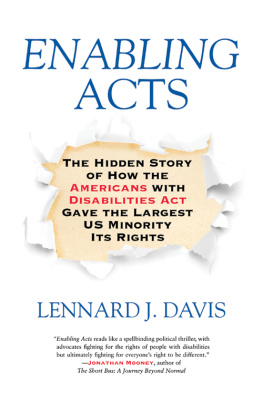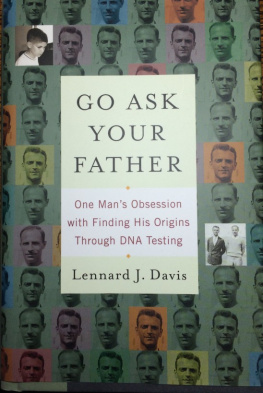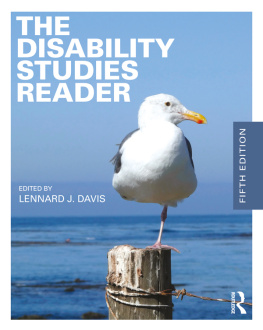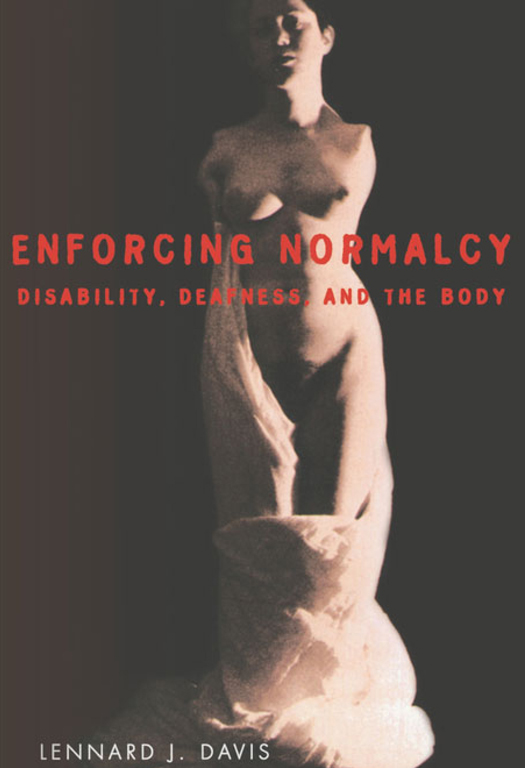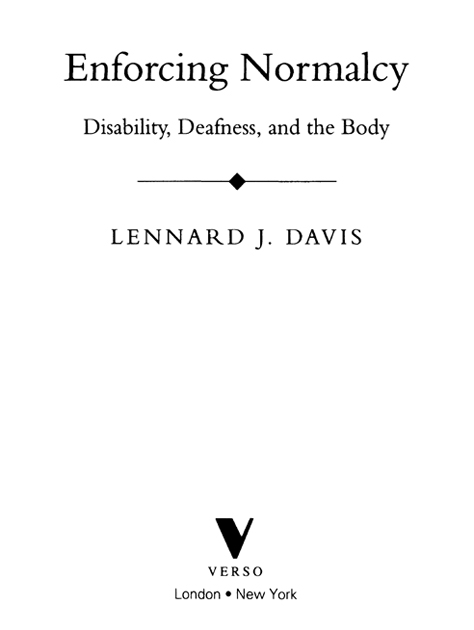First published by Verso 1995
Lennard J. Davis 1995
All rights reserved
Verso
UK: 6 Meard Street, London W1V 3HR
USA: 180 Varick Street, New York NY 100144606
Verso is the imprint of New Left Books
ISBN 1859849121
ISBN 1859840078 (pbk.)
British Library Cataloguing in Publication Data
A catalogue record for this book is available from the British Library
Library of Congress Cataloging-in-Publication Data
Davis, Lennard J., 1949
Enforcing normalcy : disability, deafness, and the body / Lennard
J. Davis
p. cm.
Includes bibliographical references.
ISBN: 978-1-85984-007-8
eISBN: 978-1-78478-000-5
1. Sociology of disability. 2. HandicappedSocial conditions.
3. DeafSocial conditions. 4. DeafnessSocial aspects.
5. Discrimination against the handicapped. 6. Body, HumanSocial
aspects. I. Title.
HV1568.D39 1995
362.42dc20 9531509
v3.1
As for the exposure and rearing of children, let there be a law that no deformed child shall live.
Aristotle, The Politics
Contents
Dedicated to my daughter, Francesca Eva Mirabella-Davis, who fights for justice every day, and to my CODA (Children of Deaf Adults) brothers and sisters, who provided an oasis for me where I could dwell with my Deafness.
Preface
This book tries to think through some of the complex issues raised by concepts such as the body, the normal, the abnormal, disability, the disabled, people with disabilities. I wrote this book because I believe deeply that people with disabilities, Deaf people, and others who might not even consider themselves as having a disability have been relegated to the margins by the very people who have celebrated and championed the emergence of multiculturalism, class consciousness, feminism, and queer studies from the margins.
In the few years that I have been associated with disability studies, I have noticed that books about disability are usually little read; academic sessions at professional conferences, and other types of meetings about disability are usually poorly attended. When I talk about culturally engaged topics like the novel or the body I can count on a full house of spectators, but if I include the term disability in the title of my talk or of a session the numbers drop radically. This is not only my experience: I received a cautionary warning from a colleague who uses a wheelchair as we planned a session at the Marxist Scholars Conference in New York in 1994. People dont come to sessions on disability. They think it is a specialized area and only the disabled come. It has been true that when I speak about disability inevitably people drift up from the audience to tell me about themselves and their family members who are deaf, blind, and so on. There is always an eagerness in their approach, because disability is the bodily state that dare not speak its name in professional circles.
My response to my colleague was that our goal should be to help normal people to see the quotation marks around their assumed state. The fact is that disability as a topic is under-theorized a remarkable fact for this day when smoking, eating a peach, or using a bodily orifice are hyper-theorized. Because of this under-theorization, which is largely a consequence of the heavy control of the subject by medical and psycho-social experts, the general population does not understand the connection between disability and the status quo in the way many people now understand the connection between race and/or gender and contemporary structures of power. I hope that as a result of the efflorescence of studies on disability from within the community of people with disabilities the day is not far off when the majority will dismiss the current dominant view as antiquated and find it hard to believe that such a regressive understanding of the body could ever have been held by intelligent, progressive people.
In writing this book, I focus among other impairments on deafness particularly. In some sense, I consider deafness as the best-case scenario to describe general attitudes toward people with disabilities. Some may argue, and indeed many in the Deaf community will argue, that deafness is not a disability. It has become increasingly common for deaf people to deny the term disabled, and to dissociate themselves from other people with disabilities. So before I discuss anything else, I must deal with this set of issues.
It should be said that the term disabled is not a very good one. It was used to replace the worse term handicapped. That word itself derives from the phrase hand i cap, according to the Oxford English Dictionary, and originally appeared in the seventeenth century to describe a kind of lottery in which one person challenged some article belonging to another, for which he offered something of his own in exchange. The drawing of items from a hat was involved, and an umpire was chosen to note the difference of value between the two objects exchanged. Then in the eighteenth century, the term came to refer to horse races in which an umpire would assign extra weight to be carried by establishment specifically to link impairment to the notion of competition and unfair inability to compete, a model that will fit well with capitalist notions of the functionality of the human body, as we will see. Disability, on the other hand, survives from a usage that links any impairments not pigeonholed as physical limitation together without creating a discourse of disability.
The term differently abled has been recently used, but strictly needs to be applied to everyone, since all people, not just those who are paraplegic or autistic, are differently abled. (One person is a better artist; another better at sports.) The principle of difference is in fact the principle of meaning in linguistics: things mean by differing from each other. In this usage, therefore, the term abled describes everyone not just those with physical limitations and the term ability includes but does not stigmatize disability.
The term person with disabilities is preferred by many to disabled person since the former term implies a quality added to someones personhood rather than the second terms reduction of the person to the disability. In this text, I will use the former term as much as possible, but it is not a felicitous term for a writer, and I ask readers for some forbearance here. I will use the term disabled person only when I am talking about the object created by ableist society.
These terms are all hopelessly embroiled in the politics of disability, or ability if you like. Given that caveat, I do nevertheless use the term disability since it seems to be one that most people state. As such, the Deaf do not regard their absence of hearing as a disability, any more than a Spanish-speaking person would regard the inability to speak English as a disability. Since most culturally Deaf people were reared in the Deaf community, went to the same residential schools, speak the same language, and participate in the same culture, they see themselves as different from other people with disabilities who, unless they take steps to become politically organized, are often isolated with their particular disability. Furthermore, the Deaf do not wish to be associated with, say, autism or schizophrenia. They see their state of being as defined not medically but rather socially and politically. Aside from self-help or social groups, people with disabilities have only relatively recently begun to think of themselves as a community. For example, if a person is born without a leg, or contracts polio or meningitis and loses the ability to walk or speak, that person is not automatically part of a culture, a language, a way of life. Such a person is, so the argument goes, just a person with a limb missing or with a speech problem. Or if a person is mentally delayed, he or she cannot be said to be part of a culture of the mentally delayed.


